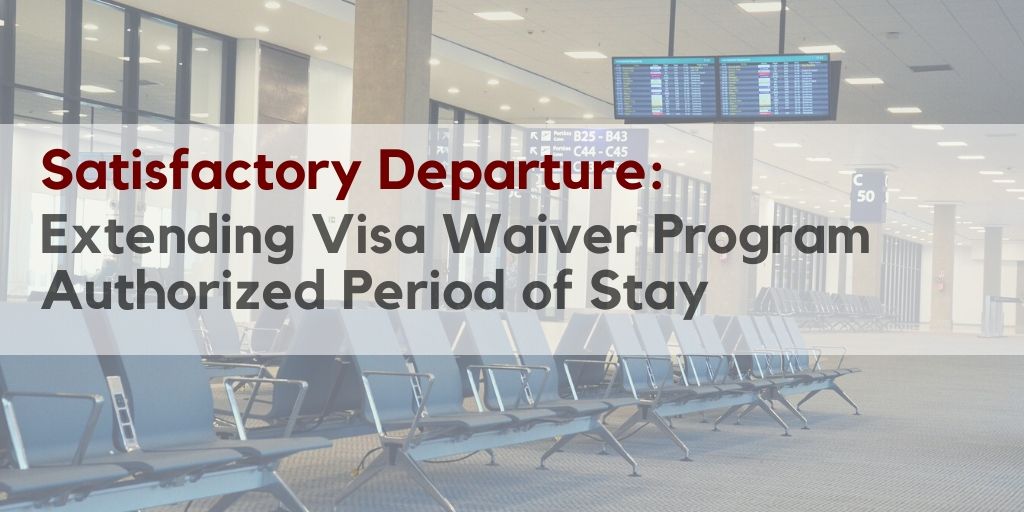Extending Visa Waiver Program Period of Stay Using Satisfactory Departure
As a result of the Coronavirus/Covid-19 travel disruptions and border closures, many Visa Waiver Country nationals are in the United States within an ability to depart the U.S. before their 90-day authorized period of stay (I-94) expires. There are limited (but expanding) options for getting relief for Visa Waiver Country nationals stuck in the U.S.
About the Visa Waiver Program
The Visa Waiver Program (VWP) has been in place since 1986, and allows citizens of participating countries to travel to the United States for as long as 90 days during a single visit without a visa. Among others participating countries include Japan, South Korea, France, the United Kingdom and Germany (see all countries). Travelers using the program to visit the United States are still required to undergo screening and register using the ESTA system, but are not subject to the lengthy in-person consular interview process visa applicants go through.
Once admitted into the U.S., a VWP traveler is normally granted a period of stay of 90 days and the validity is noted on the U.S. CBP passport entry stamp and also reflected on the electronic I-94 card admission record (can be obtained here).
Negative Consequences of Overstaying I-94
Overstaying the I-94 admission date has significant negative consequences, depending on the duration of the overstay. But, generally, an overstay of less than 180 days may result in ESTA cancellation, inability to use the Visa Waiver Program in the future and requirement to have to apply for a U.S. visitor at the U.S. Consulate abroad before being able to come back to the U.S. as a visitor.
How to Extend Visa Waiver Program Authorized Stay – “Satisfactory Departure”
The Visa Waiver Program, by law, does not allow applying for an extension, change of adjustment of status. This makes it impossible for a visa waiver visitor to file I-539, Application to Extend or Change Status, which is the normal way a nonimmigrant in the U.S. can seek to extend or change their status.
The option for Visa Waiver Program visitors is to seek what is called “Satisfactory Departure:”
(a) Satisfactory departure. If an emergency prevents an alien admitted under this part from departing from the United States within his or her period of authorized stay, the district director having jurisdiction over the place of the alien’s temporary stay may, in his or her discretion, grant a period of satisfactory departure not to exceed 30 days. If departure is accomplished during that period, the alien is to be regarded as having satisfactorily accomplished the visit without overstaying the allotted time.
Under Satisfactory Departure, a VWP traveler may be granted 30 additional days if there is an emergency situation that prevents the person from departing the U.S. within their period of authorized stay. As long as the traveler leaves within the 30-day window, they will not be considered to have overstayed their authorized period of stay.
How to Request Satisfactory Departure?
Initially, CBP only allowed requests made by VWP travelers who were admitted into the U.S. through JFK, Newark Liberty Airport (EWR) or Raleigh Durham International Airport (RDU). The list is growing and at the time of this article we understand that there are procedures at Boston Logan, Chicago O’Hare, Honolulu, Houston, LAX, Milwaukee.
Eligible VWP travelers must contact CBP’s Deferred Inspections office to request Satisfactory Departure for a period of up to 30 days. At this time it is unclear if there will be a possibility of further extension if the travel disruptions and border closings continue beyond 30 days.
Our understanding is that at JFK and EWR, requests are limited to those whose VWP/ESTA period of stay will expire within 14 days. At RDU, requests are limited to those whose VWP/ESTA period of admission will expire within three days. Different ports of entry appear to have different procedures.
Eligible travelers will be required to provide their name, date of birth, and passport information. They may also be asked to provide their original travel plans (flight itineraries) in addition to their new updated travel itineraries (if available or possible to obtain).
How We Can Help You?
Our office can assist Visa Waiver Program nationals who are in the U.S. submit a request for Satisfactory Departure on their and their family members’ behalf. The situation is certainly fluid with various CBP ports adding or changing the procedures and requirements; however, our office has the experience and capability to help stranded VWP travelers seek Satisfactory Departure. Please reach out if we can be of any help.
Conclusion
At this time it remains unclear if or when CBP will expand the availability of the Satisfactory Departure program to other ports of entry and if they will allow additional periods in the event the current travel disruption goes beyond 30 days.
We will continue to monitor and provide updates on this and related topics. Our office will be happy to provide assistance or consult on this or related matters. Please feel free to subscribe to our free weekly newsletter to obtain developments on this topic.
Related News and Articles
The Capitol Immigration Law Group has been serving the business community for over 15 years and is one of the most widely respected immigration law firms focused solely on U.S. employment-based immigration. Disclaimer: we make all efforts to provide timely and accurate information; however, the information in this article may become outdated or may not be applicable to a specific set of facts. It is not to be construed as legal advice.

